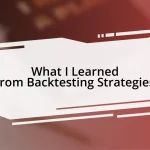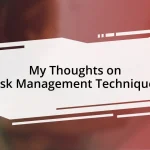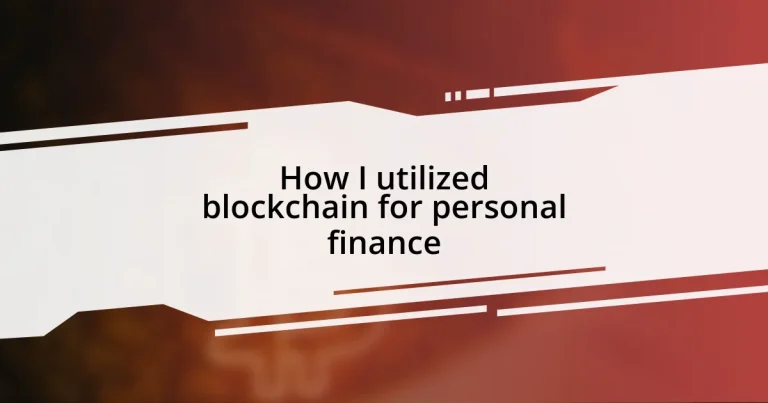Key takeaways:
- Many individuals face challenges in personal finance, including unexpected expenses, impulsive spending, and a lack of financial oversight.
- Blockchain technology offers secure, transparent, and efficient methods for managing personal finances through features like immutability and smart contracts.
- Using blockchain apps enhances budgeting and expense tracking, providing real-time insights, accountability, and encourages setting tangible financial goals.
- Investing with blockchain solutions simplifies processes and improves transparency, making individuals more engaged and informed about their financial futures.
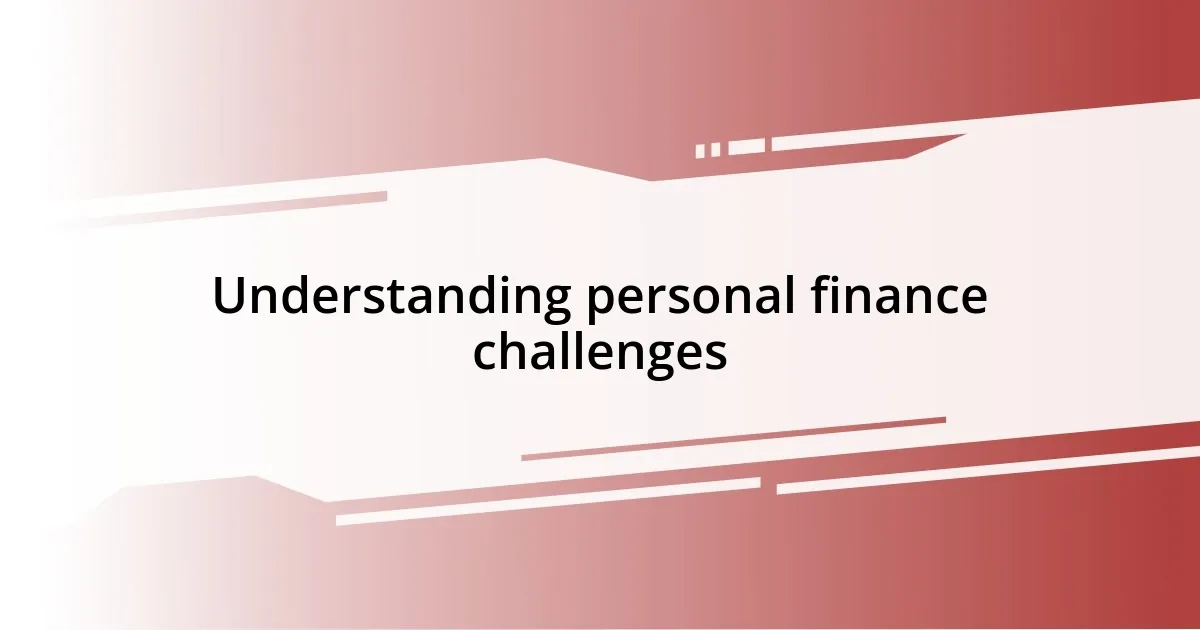
Understanding personal finance challenges
Navigating personal finance can feel overwhelming, especially when unexpected expenses pop up like a surprise bill or a car repair. I remember the sinking feeling I had when I faced a sudden medical expense—it was a stark reminder of how unprepared I was. Have you ever felt that rush of panic when your budget didn’t align with reality?
Many people struggle with managing their spending while trying to save for future goals. I often found myself caught in the cycle of impulsive purchases, thinking it would all balance out in the end. It’s that age-old question: How do we find the right balance? Because let’s be honest, saving and spending sometimes feel like opposing forces battling for control over our wallets.
Another challenge is keeping track of all those tiny financial details that add up over time. I used to jot down my expenses haphazardly, which only added to my confusion. Have you ever lost sight of where your money goes? It’s frustrating, isn’t it? Understanding each piece of the puzzle is crucial for gaining control over your finances.
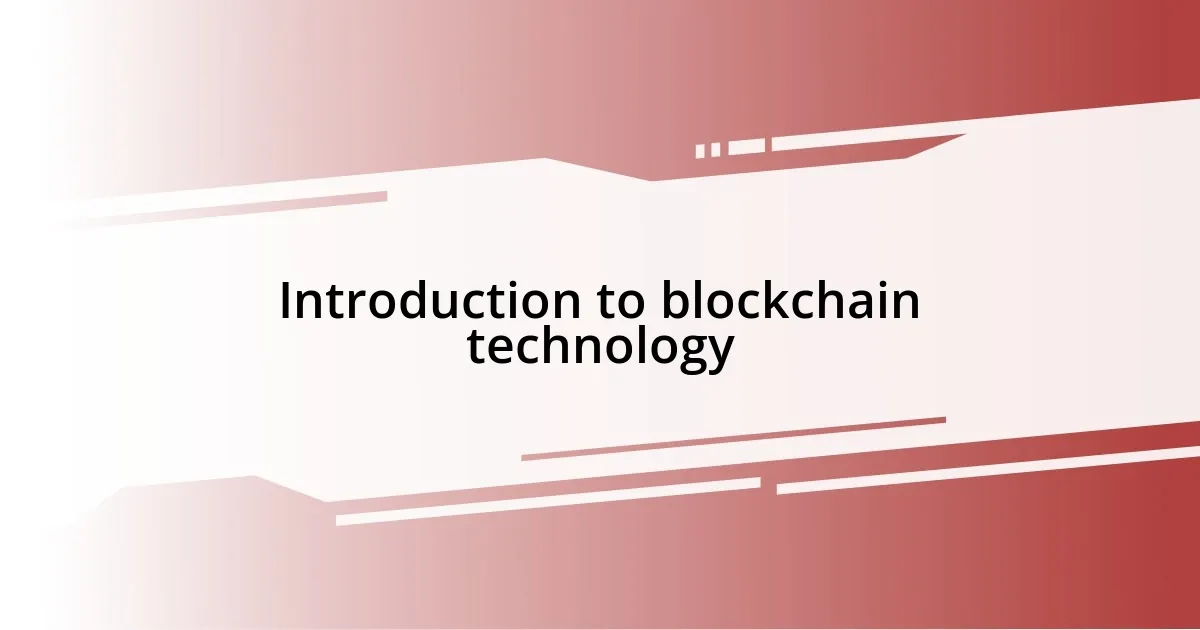
Introduction to blockchain technology
Blockchain technology is a revolutionary concept that changes how we think about transactions. At its core, it is a decentralized digital ledger that securely records information across multiple computers. I remember the first time I heard about it; the idea of a transparent and tamper-proof way to track assets really piqued my interest. Have you ever wondered what makes blockchain so resilient against fraud? It’s all about the way it structures data.
One of the most compelling features of blockchain is its immutability. Once data is entered into the blockchain, it cannot be altered without consensus from the network. I was fascinated by how this could provide a level of security and trust that traditional systems often lack. Have you ever wished for a way to ensure your financial transactions were beyond dispute? That’s the promise of blockchain—it brings a new level of integrity to our financial dealings.
Additionally, blockchain enables smart contracts, which are self-executing contracts with the terms of the agreement directly written into code. I recall the excitement I felt when I realized how this could automate processes and reduce the need for intermediaries. Imagine making a secure transaction without waiting for a bank to clear it! The potential applications for personal finance are truly limitless, offering tools that empower individuals to take control of their financial futures.
| Feature | Description |
|---|---|
| Decentralization | No central authority; data is stored across multiple locations. |
| Immutability | Data cannot be changed once recorded, ensuring integrity. |
| Smart Contracts | Automated contracts that execute when conditions are met. |
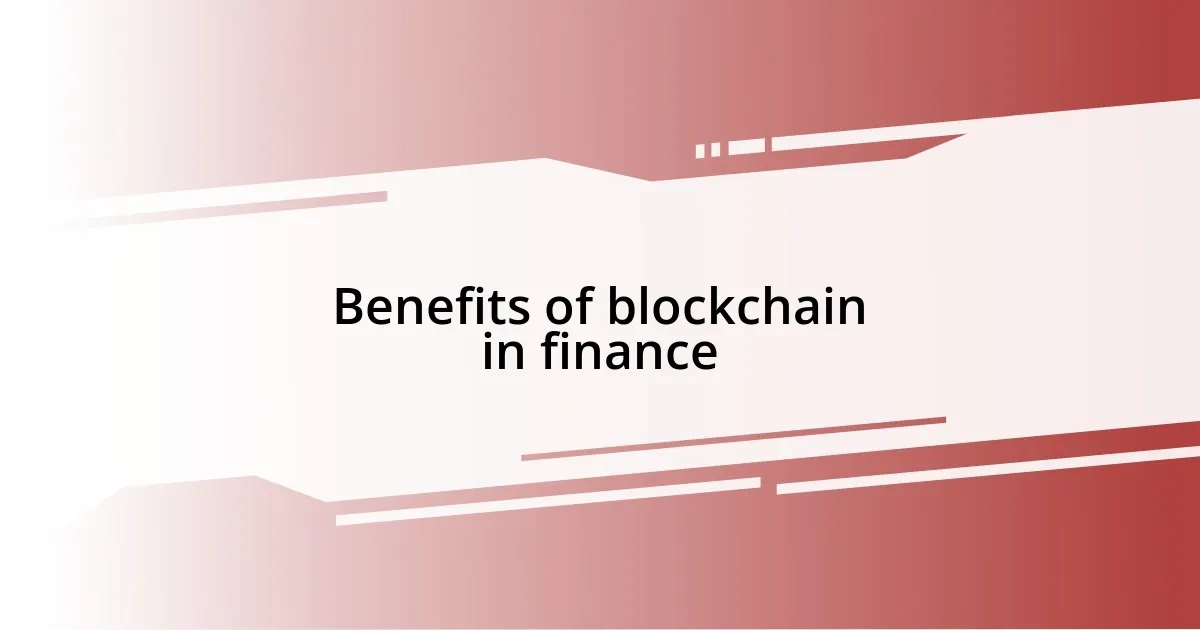
Benefits of blockchain in finance
I’ve seen firsthand how blockchain transforms personal finance into a more secure and streamlined experience. The enhanced transparency it offers is something I truly value; tracking my transactions feels like I have a real-time roadmap of my financial journey. It’s reassuring to know that every penny is accounted for, reducing that nagging anxiety about potential discrepancies.
Here are some standout benefits of blockchain in finance:
- Transparency: All transactions are visible on a public ledger, promoting trust and openness.
- Security: Advanced encryption protects data from unauthorized access or fraud.
- Lower Costs: By eliminating intermediaries, blockchain can significantly reduce transaction fees.
- Faster Transactions: Blockchain eliminates the delays associated with traditional banking, allowing for near-instantaneous transfers.
- Global Accessibility: Individuals without access to banking can participate in the financial system through blockchain-based platforms, broadening financial inclusion.
When I first started using blockchain-based tools for budgeting and investing, I remember feeling an immediate sense of control. It’s like having a personal finance assistant that’s always monitoring my financial health. The ability to view my financial history in a simple, comprehensive manner has changed how I approach budgeting. This increased awareness allows me to make more informed decisions, ultimately leading to better financial outcomes.
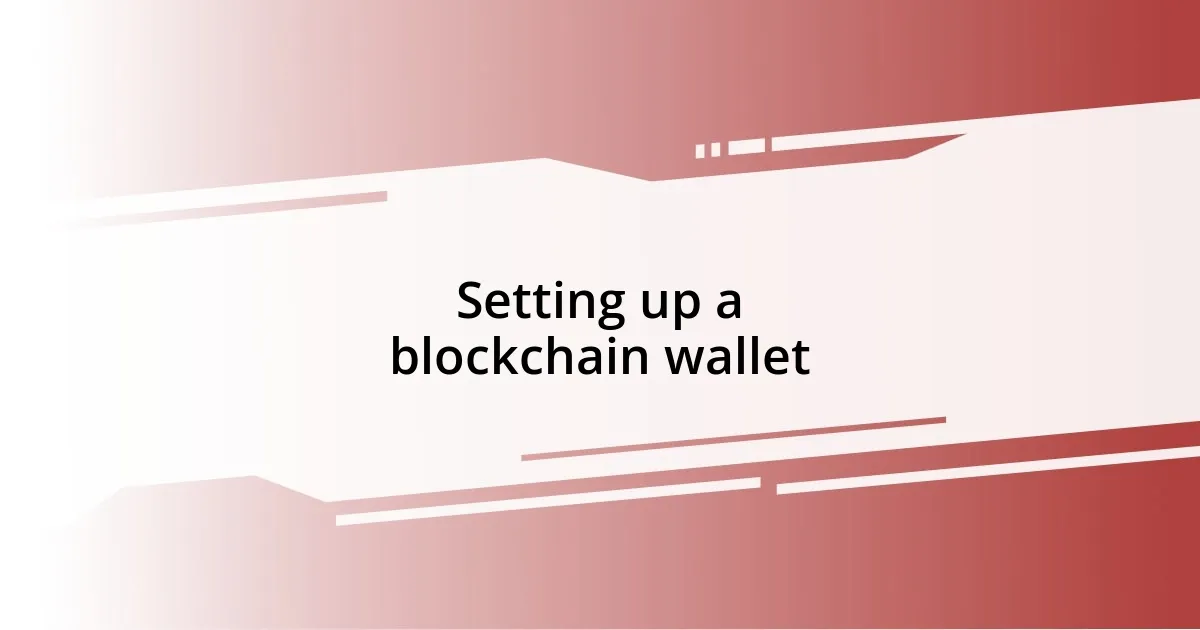
Setting up a blockchain wallet
Setting up a blockchain wallet is a crucial first step for anyone eager to dive into the world of cryptocurrency. I remember the excitement and slight trepidation I felt when I first explored this process. Choosing the right wallet—be it software, hardware, or even a mobile wallet—made me realize how important it is to balance convenience with security. Have you ever considered what kind of wallet would suit your needs best?
After selecting a wallet type, I found that the setup process was quite intuitive. Most wallets guide you through creating a unique key pair, which consists of a public key and a private key. The public key is like your bank account number—it’s safe to share to receive funds—while the private key must be kept confidential, much like your ATM PIN. It was almost liberating to understand that my financial sovereignty was in my hands, but it also hit me how critical it was to remember that private key. What would I do if I lost access?
Once my wallet was operational, I made it a priority to back it up. I remember writing down my recovery phrase, a series of words that would restore access if anything went wrong. Storing this safely felt like a rite of passage into the blockchain world. Have you thought about how you’d recover your assets? Having that backup in place eased my mind, allowing me to embrace the potential of blockchain for managing my personal finances fully.
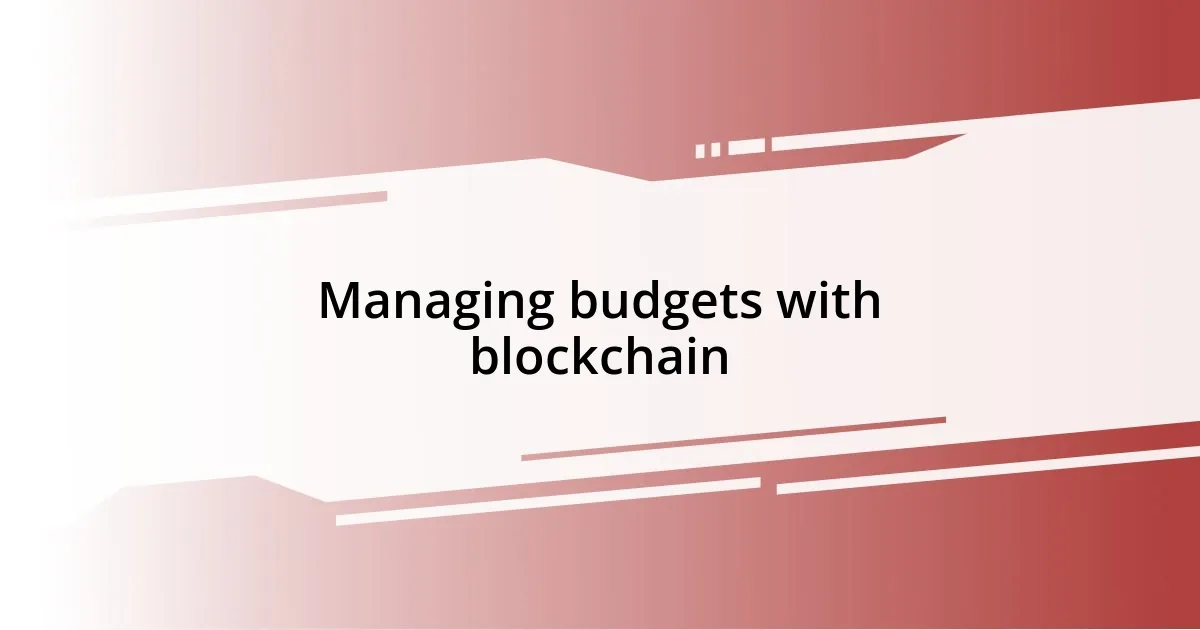
Managing budgets with blockchain
Using blockchain for managing my budget has truly revolutionized how I track my expenses. I remember the initial thrill when I linked my accounts to a blockchain-based budgeting app. The app categorizes my spending automatically, giving me instant insights into where my money goes each month. Have you ever experienced that “aha!” moment when you realize where you can cut back? It was both eye-opening and empowering.
What’s fascinating about blockchain is how it enhances accountability. Each transaction I make is recorded on this immutable ledger, ensuring that my budget remains intact without any hidden surprises. I often think about the relief this brings to my financial planning; it’s like having a trusted friend who can’t bend the truth. This clarity helps me feel more confident about reaching my savings goals and sticking to my budget. Do you know that feeling when you’re certain you’re on the right path?
Not only does blockchain streamline my budgeting process, but it also encourages me to set financial goals with tangible milestones. I’ve started to allocate my savings in a way that’s visible and transparent, allowing me to track my progress in real-time. I used to write goals down and forget about them, but now, the instant updates and reminders keep me motivated. It begs the question—how often do you revisit your financial goals, and are they as visible in your daily life as they could be? With blockchain, I’ve found a way to make those goals feel more alive and achievable.
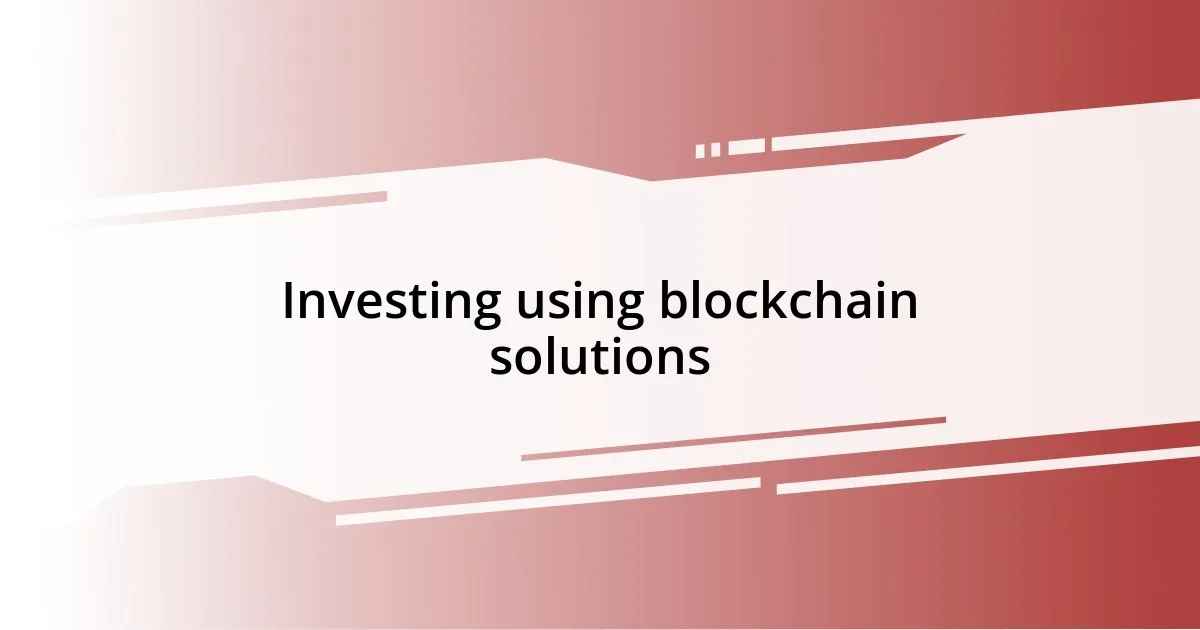
Investing using blockchain solutions
Investing using blockchain solutions has opened a new realm of possibilities for me. I vividly remember my first foray into crypto investments. The moment I executed my first transaction using a decentralized exchange, I felt a mix of excitement and apprehension. Have you ever felt that rush of adrenaline when trying something new and risky? It’s hard to describe, but it was like standing at the edge of a diving board, ready to leap.
As I delved deeper into investing, I noticed the advantages of smart contracts—self-executing contracts with agreements directly written into code on the blockchain. The security and automation they offer is a game changer. Once, I set up a smart contract for a peer-to-peer lending arrangement, and watching it execute flawlessly was exhilarating. Does the thought of automating your investment processes appeal to you? It certainly has transformed my approach to investing, allowing me to focus on strategic decisions rather than getting bogged down by administrative tasks.
What truly stands out to me, however, is the transparency inherent in blockchain investments. For instance, tracking my asset performance in real time made me more in tune with market dynamics. Each time I checked my portfolio, it felt like a personal conversation with my investments—an intimate understanding of their rise and fall. Have you ever wished you could peek behind the curtain of your investments? With blockchain, I feel as though I’m not just a passive investor; I’m actively engaging in my financial future, which brings a sense of empowerment I had never experienced before.
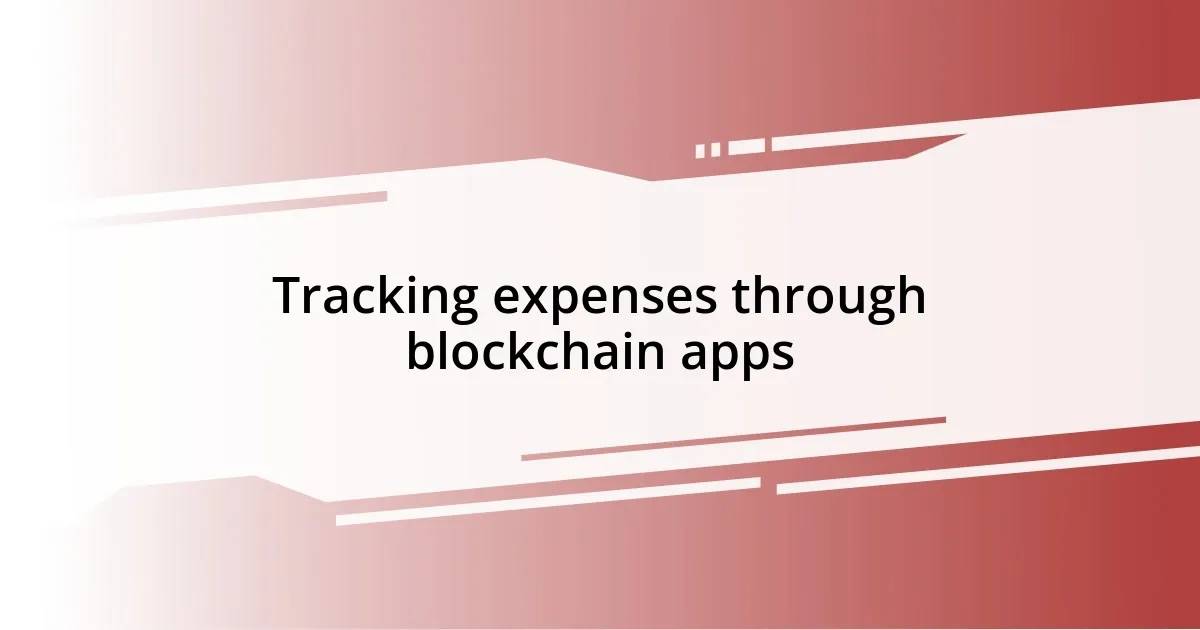
Tracking expenses through blockchain apps
Tracking my expenses through blockchain apps has changed the way I view my spending habits. I remember the first time I saw my transactions neatly organized with color-coded categories. It felt like I was flipping through a personal financial diary, giving me clarity and making me aware of my impulses. Have you ever experienced that eye-opening moment when you realize your coffee runs might be adding up more than you thought?
What impressed me most was how these apps not only categorize expenses but also employ real-time analytics. I’ve had instances where the app sent me alerts when I approached my monthly budget limit. That little nudge was often enough to stop me from making unnecessary purchases and prompted me to think: when was the last time I truly evaluated what I spent on something versus its value? This accountability has made me feel more in control of my finances.
Moreover, the ability to review my spending history on a secure blockchain ledger has a way of reinforcing my commitment to financial health. With every month that passes, I can identify trends in my expenses—like my weekly takeout habit—and adjust accordingly. Reflecting on this, I often ask myself: how many times have I felt burdened by financial stress when a simple review could have alleviated it? Now, with a few taps on my app, I find the power to change my habits lies right at my fingertips.







